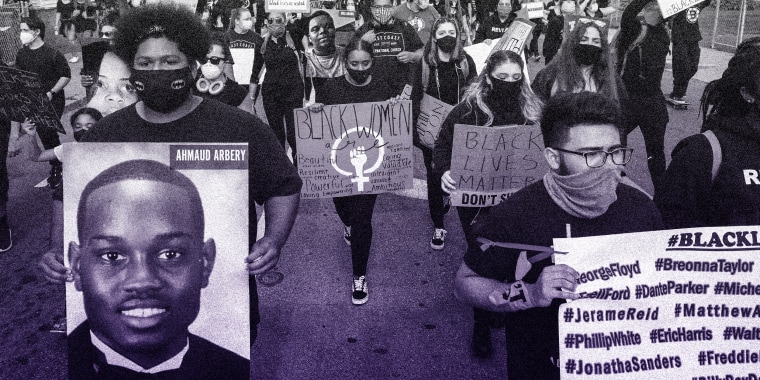Jury selection in the trial for three white men charged with murder in the death of Ahmaud Arbery, a 25-year-old Black man, began Monday. Arbery’s killing garnered national attention after gruesome video of the incident went viral last year. The case has reignited discussions about racial profiling and citizen’s arrests.
Arbery was shot and killed in February 2020 while jogging in Brunswick, Georgia, a small coastal city about 80 miles south of Savannah. Travis McMichael and his father, Gregory McMichael — the two men who confronted Arbery — as well as William Bryan — the man who recorded the deadly shooting — face several charges, including murder, aggravated assault and false imprisonment.
Each of the defendants has pleaded not guilty. The McMichaels said they pursued Arbery because they thought he was a burglary suspect, and Travis McMichael’s attorneys said he shot Arbery in self-defense. Bryan claimed he was merely a witness, despite also pursuing Arbery. There has been no evidence linking Arbery to a burglary.

The case centers largely on a now-defunct Georgia law that essentially gave private citizens the right to arrest people they believe committed a crime and whether a jury will be convinced the three men who went after Arbery were fearful for their lives.
Georgia Gov. Brian Kemp, a Republican, signed a repeal of the Civil War-era law in May after facing pressure from civil rights activists. Still, the law could factor heavily into the outcome of this case.
According to the old law, “A private person may arrest an offender if the offense is committed in his presence or within his immediate knowledge. If the offense is a felony and the offender is escaping or attempting to escape, a private person may arrest him upon reasonable and probable grounds of suspicion.”
There are reasons to believe citizen's arrests involve the same disparate treatment as arrests conducted by police.
In an attempt to bolster their claims that a citizen's arrest was justified, defense attorneys for the McMichaels are staking their arguments in unfounded allegations that Arbery was a threat and had acted aggressively due to a mental health condition. Earlier this month, a judge declined the defense's request to present Arbery's mental health records as evidence during the trial. He ruled that a registered nurse's "highly questionable diagnosis" in 2018 that Arbery suffered from mental illness could unfairly prejudice the jury, The Associated Press reported.
Evidence shows the defense received help from prosecutors in presenting Arbery as a danger to others. In particular, one of the first prosecutors assigned to the case, George Barnhill, cited the citizen's arrest law and called the pursuit “perfectly legal” in a letter recusing himself over potential conflicts of interest. (A previous prosecutor was indicted on charges of violation of oath of public officer and obstruction of a police officer by a grand jury that said she used her office to shield the men accused of killing Arbery.)
Although data is sparse, there are reasons to believe citizen's arrests involve the same disparate treatment as arrests conducted by police. New-age sleuthing technology like the app Citizen, which allows people to report disturbances via smartphone, has already been shown to perpetuate racial profiling. In addition, the issue of racially motivated 911 calls has become so prevalent that states have had to institute measures to counteract it.
Defense attorneys representing the men accused of killing Arbery want us to disbelieve our own eyes. They want us to think the violence they inflicted wasn’t in the name of racism, but rather in the name of the law.
Related stories:
The most outspoken league in sports just put Texas in its crosshairs
Critical race theory is urgently necessary. Just look at this Tennessee county.
Don’t act surprised: Conservative antisemitism is alive and well
Head over to The ReidOut Blog for more.
